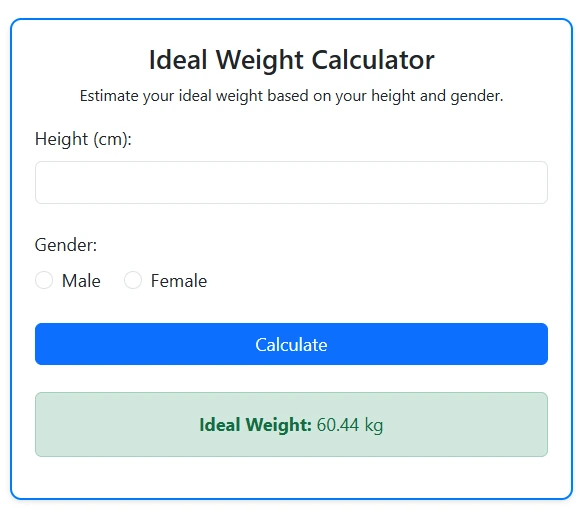Ideal Weight Calculator
Estimate your ideal weight based on your height and gender.
Estimate your ideal weight based on your height and gender.
In this section, you learn about weight and how to use the ideal body weight calculator.

For a healthy life, your body weight according to your height must be ideal. Our ideal weight calculator talks about the ideal body for males and females. Ideal body weight keeps you fit and active. If your body weight is above or less than your ideal body weight, it may cause many deaths. If your weight is more than your ideal body weight, you have to lose weight by burning more calories. You can calculate your ideal calorie intake with our weight loss calorie calculator.
Our weight loss calculator gives you information about calorie intake according to your weight, age, height, and activity level. Just calculate your ideal body weight and input it into our calorie calculator for weight loss. You will get the calorie intake to get your ideal weight, and as soon as you start consuming that calorie intake, you will get your ideal body weight.
Each individual's ideal weight range depends on factors such as age, gender, genetics, body type, past medical history, and lifestyle. Weight is one of many factors that determine overall health, and Body Mass Index (BMI) is often used to assess health risks related to weight. Although BMI doesn't directly measure body fat, research shows it strongly correlates with other methods that do.
Using a height-weight chart to determine your ideal weight is only part of the picture. You must also consider your body's proportion of fat, muscle, and bone. The most important factor is the amount of fat. Body Mass Index (BMI) is a reliable measure of how much fat you carry. While not a precise indicator, it provides a reasonable estimate of your body fat percentage.
Normal Body Mass Index (BMI) in the BMI Calculator has a scale ranging from 18.5 to 24.9. Suppose your BMI is within that range of your fit. If your BMI falls outside the normal range BMI Scale (18.5-24.9), consult a doctor for further evaluation. You can use our BMI Calculator to know what your BMI is.
Although the Body Mass Index (BMI) is commonly used to determine body weight, it has some limitations. BMI calculates a person's health status based on height and weight, but it doesn't differentiate between muscle mass and body fat. For example, someone with high muscle mass might be classified as overweight, while someone with excess fat around their midsection may have a good BMI but still be at a higher risk for health issues.
Despite these flaws, BMI is still the best method for tracking body weight at the population level and remains a reliable indicator of risks associated with being underweight or overweight. For more accurate results, BMI should be used in conjunction with other metrics, such as waist circumference, body fat percentage, and waist-to-hip ratio. You can calculate your fat by using all these parameters from our Fat Calculator.
Despite these flaws, BMI is still the best method for tracking body weight at the population level and remains a reliable indicator of risks associated with being underweight or overweight. What Causes Weight Gain?
Maintaining a healthy weight can reduce the risk of heart disease, stroke, diabetes, high blood pressure, and certain cancers. Factors such as weight, waist size, and the amount of weight gained since your mid-20s significantly impact your risk for various diseases. While genes and hormones influence weight, an energy imbalance (eating more calories than you burn) is a primary cause of obesity. Use the above Weight Calculator to calculate your healthy/ideal weight. To lose weight healthily and sustainably must be adjusted two key aspects:
Instead of focusing on dieting, consider adopting a long-term lifestyle change. A healthy diet combined with regular exercise can significantly improve your quality of life, and having a support system from family, friends, or health communities can make the journey easier.
You must be in a calorie deficit to lose weight. After calculating your ideal weight using our weight calculator, if you find yourself overweight, just cut your calorie intake to lose weight. You can also use our weight loss calculator to find out how many calories you should eat to lose weight.
To calculate your ideal weight, input your height in centimetres and select your gender.